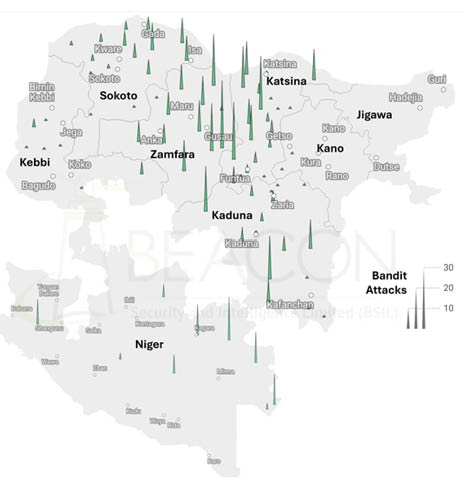In most parts of the seven (7) states (Jigawa, Kaduna, Kano, Katsina, Kebbi, Sokoto and Zamfara), that make up North-west Nigeria, the prevalent security concern is banditry, a criminal activity involving gunmen grouped into several camps that are challenging the supremacy of the use of force by the state. These gunmen, typically camped in forested and mountainous parts of some of these states or sometimes in built up communities, target residents for different forms of criminal activities, including kidnapping for ransom and wanton raids as well as illegal vehicle check points leading to loss of lives and destruction of livelihoods. Sadly overtime, an ecospace has emerged that now has different players supporting banditry, including conflict entrepreneurs, gun running channels, informants, pimps who supply them with women and drugs and several others, including women who support different aspects of crime in exchange for payment.
Despite the devastating effect of banditry, illegal mining activities have continued almost unhindered in these states. This has engendered questions on the relationship between the different conflict actors and those behind the illegal mining. There are indications that the criminal gangs that coexist with the bandits are sometimes armed by the mining structures to enable them access to the land and access routes and to deny government authorities and competitors. Other indicators are that the criminal gangs when not engaged by the mining structures resort to committing violent crimes, enabling a vicious cycle of conflict that has made the region one of the most insecure in the country with devastating humanitarian consequences that is largely unattended.
The nexus between rural banditry and mining in North-west Nigeria presents a complex crisis, rooted in illegal mining operations with violent competition for control of lucrative mining sites providing financial resources and sustaining their activities, which has ultimately led to environmental degradation, weak governance, and ultimately a greater sense of insecurity and displacement of populations, particularly in Kaduna, Katsina, Zamfara States as well as Niger State in North Central Nigeria.
This is coupled with the region’s porous borders with Niger, extending to as far as Burkina Faso, Chad and Mali as well as Sudan and Central African Republic. Additionally, the rugged terrain and dense forests that are spread across the region, create ungoverned spaces which allow criminality to thrive. According to Enhancing Africa’s Response to Transnational Organised Crime (ENACT), an estimated 80% of the mining of mineral resources in the region, especially of gold, is carried out on an illegal and artisanal basis; this highlights not only the exploitation of untapped mineral resources at the expense of local authorities and denying communities the benefits but also the collusion between politically connected Nigerians and foreign corporations with local threat dynamics. Curtailing this security crisis has been hampered by a lack of political will, poor coordination, and limited capacity of security forces, especially with the policing and other law enforcement and security agencies understaffed and poorly equipped to tackle organised crime.
- Coping strategies amidst rising cost of living
- We were treated like kings as students those days – Abubakar Abdulkadir
Despite the Bola Tinubu Administration’s plans to strengthen regulation in the mining sector, including a review of the rates of mining licences and other fees to bolster the mining sector’s capacity, we still see state governments setting up their regulatory frameworks, which have created confusion with the potential to deter legitimate investors. Furthermore, the deployment of 2200 marshals from the Nigeria Security and Civil Defence Corps (NSCDC) to secure mining sites represents a proactive step, however, the effectiveness of these marshals is questionable, especially given the equipment repository of the threat elements involved in both the banditry and the illegal mining and continued high levels of insecurity and safety incidents such as the mine collapses in Shiroro and Paikoro LGAs of Niger State on June 4 and 13, 2024 respectively.
To tackle the violence linked to banditry and illegal mining in Nigeria, first is, there must be a concerted effort between both federal and state governments to work together in a way that allows for the alignment of goals and concerns, creating clearer and transparent processes. It is also worthwhile for the government to engage private sector players to assist in profiling these groups and their networks and to ensure that the nexus between them and other stakeholders is identified and documented. Aspects of this have been done by journalists, non-governmental organisations and the United Nations, so it is doable. In addition, the government should explore coordinated direct communication with these groups, even though it is considered controversial. Through a systematic disarmament, demobilisation and reintegration (DDR) programme supported by Nigeria’s development partners and by engaging in talks and offering incentives for disarmament and integration into society, there’s a chance to reduce their influence over illicit mining operations. The porous borders necessitate border security collaborations with neighbouring countries and international partners to crack down on illegal gold smuggling. Enhancing the capacity and coordination of security agencies to crack down on illegal mining operations, including providing them with the necessary resources and equipment to effectively combat criminal networks can help prevent larger armed groups from gaining a foothold.
It is assessed as credible that the nexus between banditry and illegal mining in the North-west, continues to frustrate government efforts. To effectively address these issues, a cohesive and proactive security strategy is crucial to combat illicit activities and reduce the influence of criminal networks.
Adamu is of Beacon Security and Intelligence Limited, an Abuja based company that provides risk management services and that supports security, safety and resilience functions in Nigeria and across the Sahel.

 Join Daily Trust WhatsApp Community For Quick Access To News and Happenings Around You.
Join Daily Trust WhatsApp Community For Quick Access To News and Happenings Around You.

